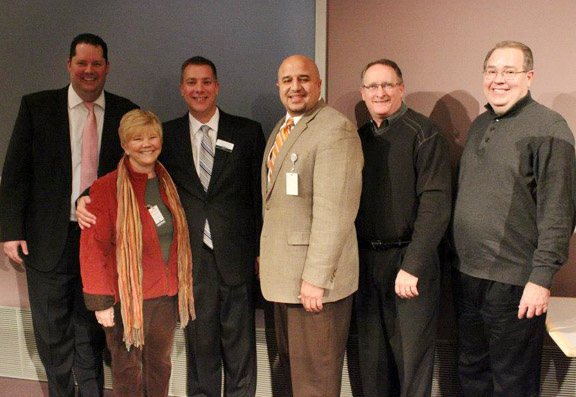“Life is short. Don’t hold back.” This was just a small sampling of the words of wisdom that kicked off the “Public-Private Partnerships” panel, as each panelist was asked to share their “six word memoir.” Many of their responses foreshadowed the discussion that followed.
The MCLP Class of 2013 has been graced by the support and presence by many local community leaders, and their November 3rd session was no exception.
The “Public-Private Partnerships” panel, moderated by Jay Verner of COUNTRY Financial, consisted of: Lonnie Smith – Public Affairs Manager at State Farm, Vicki Tilton – Chairperson of the McLean County Chamber of Commerce and owner of Fox and Hound Day Spa, Steve Denault – Executive Vice President of Corporate Services at COUNTRY Financial, David Hales – Bloomington City Manager, and Mark Peterson – Town of Normal City Manager.
Discussions explored questions such as why we need public-private partnerships and examples of public-private partnerships in the community around us. Participant, Missy Thomas, commented that she like how candid the panelists were — “they didn’t sugar coat anything.” Affordable housing needs, pension reform, cuts in disability services, and generational poverty were but a few of the issues examined by participants and panelists. In the face of these needs and economic challenges, the conversation reinforced that public-private partnerships are more important than ever.
But what does it take to create a successful public-private partnership?
First and foremost, panelists agreed that relationship-building, trust, and communication are key components. Mark Peterson commented, “In public-private partnerships, you have to trust your partner. This is acutely important in local government.” A business may ask “how stable is this government?” Likewise, a government body may ask “how trust-worthy is this business?” Lonnie Smith stressed the need for open communication among partners. “You have to know them well. A partnership can impact the reputation of the organizations involved,” so the obligations of leadership and partnership require a high level of integrity and a strong code of ethics. “The key is finding the ‘sweet spot’ where business and public interests overlap,” said Smith. Vicki Tilton and Steve Denault both commented on the need for an organization to stick with its principles. Denault advised, “Align your corporate strategies to protect the greater good of the organization. Be careful of conflicts of interest.”
Steve Denault cited a local public-private partnership example that resulted in “something good coming out of something bad.” Several local entities got together to solve a shared problem involving a health insurance need. The partnerships that formed to resolve that initial issue took the opportunity to leverage their partnerships in tackling another health-related problem — diabetes. Now in its fourth year, the program has seen a decrease in diabetes related emergency room visits. Verner summarized, “this effort was not something you could do by yourself. That’s the essence of public-private partnerships — the sum is greater than the individual parts.”
Mark Peterson reminded the group not to take these partnerships for granted. McLean County is unique in its propensity towards collaboration in this manner. For instance, “each year the One Voice task force goes to Washington, DC to advocate for local community needs.” Lawmakers in DC often remark that few other communities take such initiative. “We are not typical of most communities in this regard.”
Yet we have a long way to go as a community. David Hale called for more citizen engagement, for people to get involved not only when there is a crisis. He urges the community to be more creative with how every citizen gets more education and helps develop solutions to our problems. Participants echoed the sentiment: “We need everybody to be involved.” “Don’t just raise an issue, be part of the solution.”
Lonnie Smith reminded the group that anyone who has encountered a good leader, knows the power of one: “MCLP is a program for you to become the solution to these problems. See the power of the individual working together with others to solve problems.”
At the end of the day, MCLP Class of 2013 was asked to reflect on John F. Kennedy’s famous words (from Kennedy’s 1961 inaugural address): “Ask not what your country can do for you — ask what you can do for your country.”
